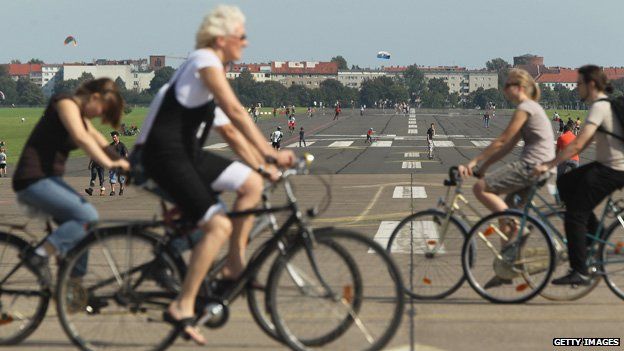Is Berlin the safest city to be a cyclist?
- Published

Berlin is enjoying a cycling boom, with miles of new cycle paths and more than half a million bike journeys made every day - but controversially, a helmet is rarely seen.
The Berlin bureau of the BBC is debating whether to buy a bike-trailer to carry around our recording gear.
Since I am one half of the Berlin bureau of the BBC, what I mean is that the producer and I are debating which sort of trailer to buy.
We could get what's called an Eco-trailer for 39 euros and 99 cents (£32) but this just wouldn't be big enough - it's meant mainly for a box of organic vegetables.
Or a heavier duty Big Cargo Trailer at 139 euros and 92 cents (£112) capable of carrying so the maker says, a load of 100kg.
I think we're going to plump for the bigger one. It won't be the easiest to tow behind our push-bikes, particularly over Berlin's cobbles, but it will make for swifter trips to interviews, and it will save money for the licence-payer.
Berlin makes getting around on two wheels a pleasure.
I have cycled in London but gave it up after too-many rants at a white van. But in Berlin, it is a joy. Firstly, the city is pretty flat, and secondly, there are endless cycle tracks. Thirdly, everybody has a bike - so car-drivers are probably also cyclists in their other lives and so keep their eyes wide open.
The test of whether cycling has really taken off in a city is who does it. In New York, it is urban warriors, young men usually, who zip aggressively between lanes.
In London, it's a bit of that, but also, I suspect, eco-zealots who are asserting their credentials - though the Boris bike scheme may be taking it more mainstream.
In Berlin, it is the people. Old ladies cycle in stately and elegant fashion, old men pedal so slowly that it's a wonder the bike doesn't fall over.
Young mothers tow toddlers in trailers - I followed one on a crisp autumn morning down Bernauerstrasse.
The baby couldn't have been much more than a year old. Every time we all stopped at a red light, the infant in the trailer would whine a little. The mother would turn and comfort the baby who would then stop crying as the bike and the buggy took off smoothly again.
The rise of the bike follows a decision by the city senate in 2005 to promote it.
So Berlin now has about 400 miles, or 600km, of bike lane. Woe betide any tourist who strays from the walking bit of the pavement to the red cycling bit.
The city is also integrating bikes into the whole transport system - you can take a bike on a train or tram, though you need a special ticket for the bike.
The state railway, Deutsche Bahn, operates what it calls - using the English that infuriates language purists - a Call a Bike scheme. There is a bank of red bikes outside the station. On the bike, there's a telephone number which you call, and the voice at the other end gives you a code to unlock the bike.
When you've finished, you lock it to something fixed and call the number with a code and somebody picks it up. You will be charged eight cents a minute.
But most of us have our own bikes. We do not wear helmets. It is foolish, but we don't. I always mean to - but I don't. I realise that the brain is man's second favourite organ - but I still leave my helmet behind.
There is an argument now that if cities insist on helmets for bike-hire schemes, then people simply don't ride bikes. And if people don't ride bikes, then they're less fit and that means that more of them die of heart-attacks.
On this argument, insisting on helmets raises the overall death rate.
I haven't ridden a bike in Melbourne, for example, though it's an Australian city I know well. It has a bike-hire scheme, but officialdom insists on helmets - with the result that few people ride bikes or what they call their deadly treadlies.
What you really need to get people on a bike is a general atmosphere of safety and a tolerance of cyclists.
And in Berlin, the authorities are benign. It's true, there are regulations against cycling on the pavement - but I've been chided only once, and then by a member of the public and not the police.
Penalties are usually only imposed if someone is hurt.
With admirable German precision, the rules say that jumping a light that's been red for more than a second incurs a fine - but tell that to the irritating urban warriors who shoot through.
I never jump a red light - that would be stupid. Like not wearing a helmet.
How to listen to From Our Own Correspondent:
BBC Radio 4: Saturdays at 11:30 GMT and some Thursdays at 11:00 GMT
BBC World Service:Short editions Monday - Friday - see World Service schedule.